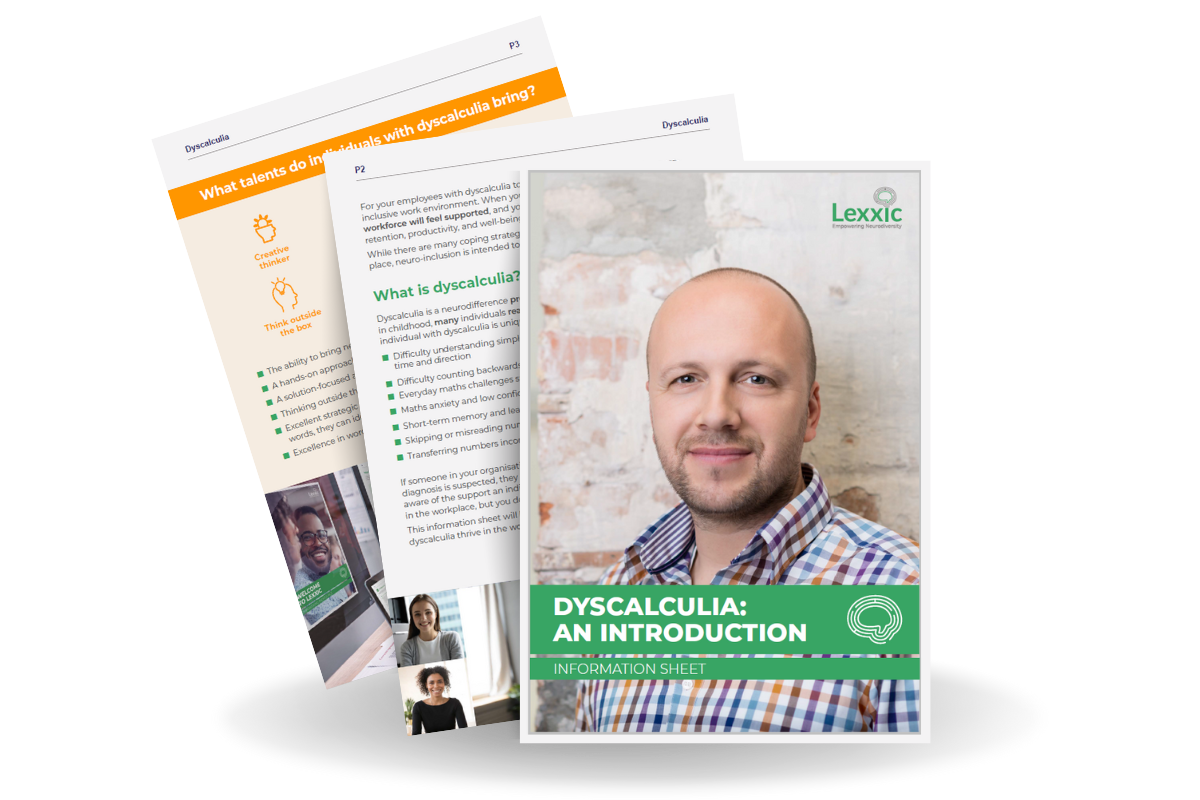Dyscalculia
Dyscalculia is a neurodifference that affects a person's ability to understand and use mathematical skills. It is estimated that around 5% of the population have dyscalculia, which is often referred to as "number blindness", and it can affect individuals of all ages.
Dyscalculic individuals may have challenges with basic arithmetic, such as adding, subtracting, multiplying and dividing. They may also have challenges with more complex mathematical concepts, such as algebra and geometry. Dyscalculia can affect a person's ability to tell the time, count money, and measure distances accurately. It can also impact their ability to understand and interpret graphs, charts and other visual representations of numerical data.
What is Dyscalculia?
Dyscalculia is a neurodifference that affects an individual's ability to understand and work with numbers.
Dyscalculic individuals may experience challenges with:
Understanding and using symbols and signs related to mathematics, such as +, -, ×, ÷, =, <, and >
Recognising patterns and sequences
Understanding the concept of time and estimating time
Measuring and estimating distances
Understanding and working with money
Memorising and recalling mathematical facts, such as multiplication tables
Understanding and applying mathematical concepts, such as fractions, percentages, and decimals
It is important to note that dyscalculia is not the result of a lack of intelligence or effort. It is a neurodifference that affects the brain's ability to process and understand numerical information.
Some people are born with dyscalculia, others acquire it after a stroke, or head injury, or as a result of another neurological condition. When it is acquired, it is known as ‘acalculia’.
Dyscalculia can have a significant impact on an individual's daily life, however, with the right support, dyscalculic individuals can learn to manage their challenges and thrive in their personal and professional lives.
“My job involves working with customers, which I love, but occasionally I have to create invoices and I would often make mistakes. Now, I use templates that make the process a lot simpler, and I have a speaking calculator so I don’t have to worry about mixing up symbols like I used to.”
- Vaishni,
Senior Digital Designer
Common Strengths Associated with Dyscalculia
Dyscalculic individuals may face challenges in certain areas, but many often also possess unique strengths that may be highly valuable in both their professional and personal lives. Here are some of the strengths commonly associated with dyscalculia:
Spatial reasoning: Many dyscalculic individuals have strong spatial reasoning skills, which can be useful in fields such as architecture, engineering, and art.
Creativity: Dyscalculia has been linked to increased creativity, as individuals with this neurodifference often need to find alternative ways to solve problems. This creativity can be useful in fields such as writing, music, and design.
Verbal skills: Some dyscalculic individuals may have strong verbal skills, which can be useful in fields such as journalism, law, and public speaking.
Visual thinking: Dyscalculic individuals often think in pictures, which can be useful in fields such as graphic design, photography, and film.
It is important to recognise that dyscalculia does not define an individual's abilities or potential. By focusing on their strengths, dyscalculic individuals can achieve success in a wide range of fields.
Many people with dyscalculia possess unique skills. These skills vary from person to person, but commonly include creativity, problem-solving, intuitive and strategic thinking and having a love of words.
Causes of Dyscalculia
While the exact causes of dyscalculia are not yet fully understood, research has identified several factors that may contribute to its development:
-
Research has shown that genetics can play a role in the development of dyscalculia. Studies have found that children with a family history of dyscalculia are more likely to develop the neurodifference themselves. Researchers have also identified several genes that may be associated with dyscalculia.
-
Environmental factors can also contribute to the development of dyscalculia. Children who experience a lack of exposure to numbers and mathematical concepts during early childhood may have an increased chance of developing dyscalculia.
Other environmental factors that may contribute to dyscalculia include:
Poor teaching methods or inadequate instruction in mathematics.
Traumatic brain injury or other neurological conditions.
Attention deficit hyperactivity disorder (ADHD) or other neurodifferences.
Common Traits Associated with Dyscalculia
Let’s look at some of the traits associated with a diagnosis of dyscalculia:
Childhood Traits
In children, dyscalculia can manifest in various ways. Some common traits include:
Challenges understanding basic number concepts such as counting, addition, subtraction, multiplication, and division
Challenges memorising basic arithmetic facts
Challenges understanding mathematical symbols and concepts
Challenges with mental arithmetic
Challenges with problem-solving and applying mathematical concepts in real-life situations
Adult Traits
In adults, dyscalculia can continue to cause challenges with mathematics. Some common traits include:
Challenges with basic arithmetic operations
Challenges with fractions, decimals, and percentages
Challenges with time and money management
Challenges with spatial awareness and visualising numbers
Challenges with reading and interpreting graphs and charts
Did You Know?
Dyscalculia often partners with having other neurodifferences
A common term for dyscalculia is ‘number blindness’
Dyscalculia is not linked to low intellect
Many famous people have dyscalculia
(for example, Cher, Henry Winkler and Robbie Williams)
Diagnosis of Dyscalculia
A formal diagnosis of dyscalculia can be made by a qualified professional, such as an educational or occupational psychologist. The assessment may involve:
An interview with the individual to understand their history and traits
Cognitive tests to assess mathematical ability and overall cognitive functioning
Standardised tests to assess mathematical ability
It is important to note that dyscalculia can often co-occur with other neurodifferences such as dyslexia and attention-deficit/hyperactivity disorder (ADHD). As a result, a comprehensive assessment from a qualified professional is necessary to accurately diagnose dyscalculia.
Living with Dyscalculia
Dyscalculia can have an impact on various aspects of life, including education, social interactions, and career choices:
-
Dyscalculia can affect a student's academic performance in several ways. Dyscalculic students may have challenges with basic arithmetic operations such as addition, subtraction, multiplication, and division. They may also have challenges with more complex mathematical concepts such as fractions, decimals, and algebra. This can make it challenging for them to keep up with their peers in maths classes and may lead to lower grades.
Dyscalculia can also affect other subjects that require mathematical skills, such as science and economics. This can make it challenging for dyscalculic students to pursue certain career paths that require a strong foundation in mathematics.
-
Dyscalculia can have an impact on certain social situations. Dyscalculic children may feel embarrassed or frustrated when they have challenges with basic mathematical concepts, which can lead to low self-esteem. They may also find it challenging to participate in activities that involve numbers, such as playing games that require counting or keeping score.
Dyscalculia can also affect an individual's ability to manage money. For example, dyscalculic individuals may find it challenging to understand financial concepts such as interest rates, and may have challenges managing a budget.
-
Dyscalculia can also have a significant impact on an individual's career choices. Many careers require a strong foundation in mathematics, and dyscalculic individuals may have challenges in pursuing these careers. For example, careers in science, technology, engineering, and mathematics (STEM) fields often require advanced mathematical skills.
However, it is important to note that dyscalculia does not preclude an individual from pursuing a successful career. There are many careers that do not require advanced mathematical skills, such as writing, art, and social work.
Despite the potential impact dyscalculia can have on certain areas of life, with proper support, understanding and accommodations, dyscalculic individuals can achieve their goals and lead very successful lives.
Download our Dyscalculia Information Sheet:
This information sheet has been created by our team of expert psychologists, and provides information about Dyscalculia, common challenges, and suggestions of the support available.
How Can Lexxic Help?
At Lexxic, we have a range of diagnostic tools to help assess your needs, or the needs of your employees.
Our team of highly qualified psychologists provide support and advice for adults in the workplace. We work with you from the point of diagnosis, through to identifying what you need to get the best long-term outcomes.
We can help you to better understand your strengths and challenges, know your learning style, and give you training for specific skills.
Get in touch if you would like to chat with one of our team, or find out more about the services we can provide.




